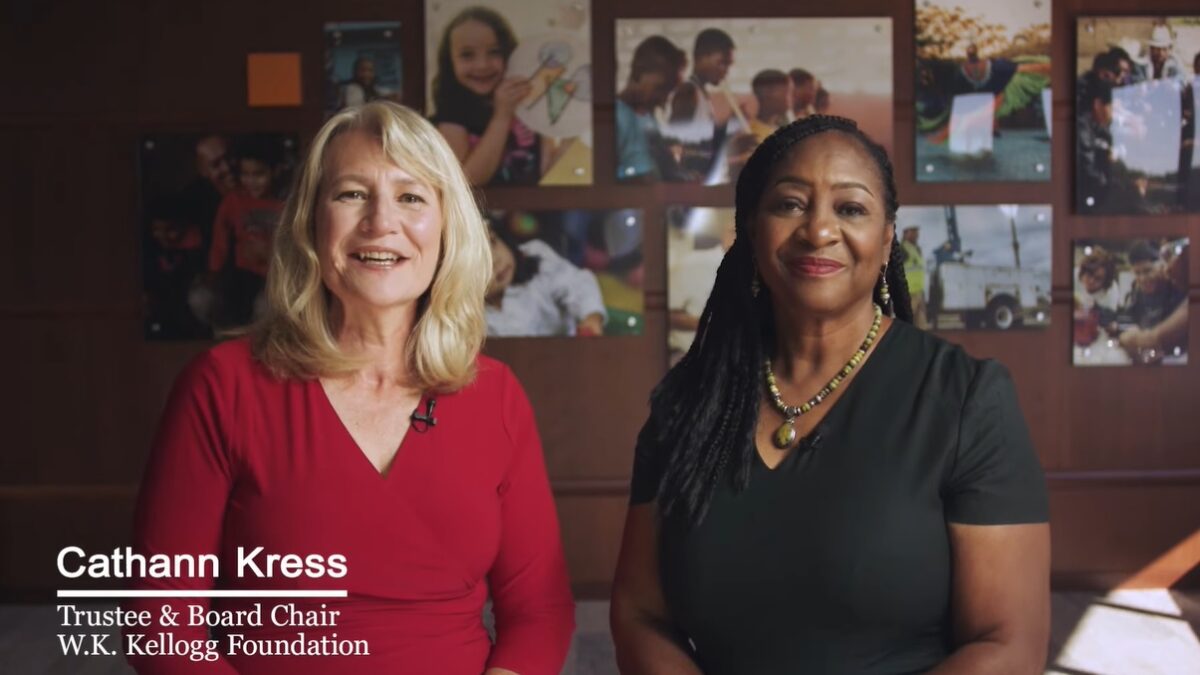It looks like Kellogg corporate executives are more interested in leftist virtue signaling than paying their workers---the workers that put Corn Flakes on millions of tables every morning.
W.K. Kellogg Foundation Trustee and Board Chair Cathann Kress says, "As stewards of our children's future, we must collectively face the primary challenge of our time: racial equity."
She has a plan to bring "equity" to the nation and the world.
However, hundreds of employees who work for Kellogg and create the family's wealth are asking why the company refuses to pay them a fair or "equitable" wage.
And why don't the recipients of Kellogs' charity appreciate them?
Be informed, not misled.
On Tuesday, a new database from the conservative-leaning Claremont Institute revealed the breakfast cereal giant pledged $91 million to the Black Lives Matter movement and related causes after the George Floyd riots.
Black Lives Matter (BLM) was founded in 2013 by Patrisse Cullors, Alicia Garza, and Opal Tometi. The slogan has certainly won public support. Particularly among those who are virtue signaling.
Although Garza and Cullors--- both Marxist trained lesbians---by their own admission---would likely say thank you, except they are not with the organization anymore. They've moved on after buying a number of high-end homes in California and elsewhere.
The more thoughtful donors have been asking who is actually running the organization, while local activist groups have been asking why none of the money flowed to the local activists as promised.
However, the important part is that Cathann actually gave them lots of money.
And she plans to give more. Much more.
In 2020, the company launched the Racial Equity 2030 Global Challenge, an injection of $90 million to “fuel innovative and actionable solutions to build a racially equitable future.”
The campaign was launched to mark the foundation’s 90th anniversary.
“In Oct. 2022, five awardees were named to receive a combined $80 million over the next eight years, concluding in 2030, the W.K. Kellogg Foundation’s 100th anniversary,” according to the foundation's website.
However:
The awards came as the Kellogg company faced conflict with its employees, who went on a nearly three-month strike in 2021. About 1,400 workers across four states — Michigan, Nebraska, Pennsylvania, and Tennessee — picketed against plans for a two-tiered benefits system complete with 72- to 84-hour work weeks and limited vacation time. .
Rolling Stone reported the company axed health benefits during the strike, leaving workers to pay exorbitant COBRA premiums to maintain coverage for expensive pre-existing conditions including cancer.
But the virtue signaling continued.
In June 2020, the company---in addition to the foundation--- expressed its commitment to “combatting racism” with $1 million to the NAACP in a corporate press release.
“Kellogg Company’s $1 million grant complements the funding that the W.K. Kellogg Foundation provides to NAACP, including $1.15 million in 2020,” wrote Kellogg Company Chairman and CEO Steve Cahillane. “NAACP is one of the many racial equity anchor organizations that WKKF supports.”
Virtual signaling is flakey.
Despite the company’s professed commitment to “racial equity,” activists targeted the cereal company as racist for featuring “three white boys” as the cartoon mascots for Rice Krispies. Black Lives Matter activist and former UK member of Parliament Fiona Onasanya went after the food giant for peddling “white supremacy” with its fictional characters.
“Coco Pops and Rice Krispies have the same composition (except for the fact [Coco Pops] are brown and chocolate flavored)… so I was wondering why Rice Krispies have three white boys representing the brand and Coco Pops have a monkey?” Onasanya wrote on Twitter.
@KelloggsUK, as you are yet to reply to my email - Coco Pops and Rice Krispies have the same compòsition (except for the fact CP's are brown and chocolate flavoured)... so I was wondering why Rice Krispies have three white boys representing the brand and Coco Pops have a monkey?
— Fiona Onasanya (@Fiona_Onasanya) June 15, 2020
Onasanya, who was expelled from the UK Labour Party in 2018 and lost her seat in Parliament last year after being sentenced to three months in prison for lying to police about speeding, claims the global brand is being racist with its fictional cereal characters.
Onasanya’s online attack quickly drew ridicule from users on Twitter who made sure to point out that the beloved characters of Snap, Crackle, and Pop are also the brand champions for Cocoa Krispies, the chocolate-flavored Rice Krispies.
Kellogg’s told the Daily Mail in a statement that it “stands in support of the black community.”
“We do not tolerate discrimination and believe that people of all races, genders, backgrounds, sexual orientation, religions, capabilities and beliefs should be treated with the utmost dignity and respect,” the company said, noting the Coco Pops monkey also represents the white chocolate cereal. “The monkey mascot that appears on both white and milk chocolate Coco Pops, was created in the 1980s to highlight the playful personality of the brand.”
Takeaway.
It has been said, "No good deed goes unpunished." I would add: Regardless of the motive.
Tristan Justice is the western correspondent for the Federalist and author of "Social Justice Redux" a conservative newsletter on culture, health, and wellness. He has also written for The Washington Examiner, The Daily Signal, Real Clear Politics, and Fox News.
He summarizes Kellogg's actions:
"The charge illustrates that no matter how many millions Kellogg spends to virtue signal, it will never be enough for those whose careers and pocketbooks benefit from accusing others of racism."
There is only one place where true "equity" is found, and sins are forgiven: At the foot of the cross of Jesus Christ. There is no other way given to mankind whereby we may receive true atonement for sin.
Be Informed. Be Discerning. Be Real. Be Vigilant. Be Prayerful.





